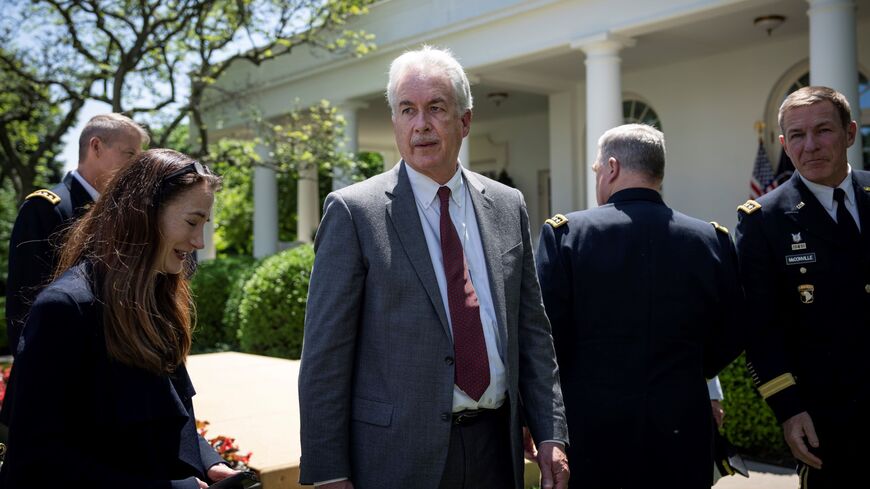Signs of debate in Tehran over Russia policy
CIA Director William Burns on Thursday warned about security ties between Iran and Russia, especially if Russia were to provide combat aircraft to Iran. The warning comes as the US this week deployed a Marine expeditionary unit, Air Force F-16 and F-35 fighter jets , and a missile destroyer to the Persian Gulf, as Jared Szuba reports.
In response, Maj. Gen. Mohammad Bagheri, chief of staff of Iran’s armed forces, said Thursday, "We have achieved sustainable and efficient deterrence” to avoid a military strike,” as reported by our correspondent in Tehran.
In addition to the increased show of firepower, US President Joe Biden, prior to a White House meeting with his Israeli counterpart Isaac Herzog, reaffirmed that there is no daylight between the US administration and the Israeli government on preventing Iran from developing a nuclear weapon, as Rina Bassist reports.
“America’s commitment to Israel is firm and is iron-clad, and we are committed as well to ensure that Iran never acquires nuclear weapons,” Biden said.
With the collapse of talks on a revised Joint Comprehensive Plan of Action (JCPOA), or Iran nuclear deal, the Biden administration and Iran are circling around an unwritten understanding that Iran would restrict uranium enrichment limits and stay below the weaponization threshold, and return to full safeguard cooperation with the International Atomic Energy Agency (IAEA), in return for some sanctions relief and the unfreezing of sanctions worth billions of dollars.
The US also expects Iran-backed militias to halt attacks on American personnel and bases in Iraq and Syria as part of the deal.
Burns’ remarks about the Iran-Russia “two-way street” signals the priority the US and the EU are placing on Ukraine. This could boil over in October, when the JCPOA calls for lifting UN restrictions on Iran’s research, development and production of ballistic missiles, and its import and export of missile- and drone-related technology. Iran was also supposed to submit to its parliament for ratification the "additional protocol," which allows the IAEA more intrusive inspection and monitoring of its nuclear programs.
As neither is going to happen, what the JCPOA called Transition Day may, finally, be the formal death notice for the deal, which has been walking dead for months, and was otherwise to sunset in 2025, as we reported here last week.
The US and the EU want to avoid an October showdown, or the threat of snapback sanctions in the JCPOA, by keeping the heat on Iran in coming months to curtail its supply of armed drones to Russia for the war in Ukraine (Iran denies doing so).
On Thursday, the European Union said it had established a "new framework for restrictive measures" to prohibit EU exports to Iran of components for unmanned aerial vehicles for Russia's war against Ukraine and in support of the Syrian government.
A senior Iranian official told Al-Monitor in February that Tehran would consider separate talks with Kyiv and Brussels on Iran’s role in the Ukraine conflict, but distinct from the nuclear talks.
Burns’ remarks this week suggested Iran may be getting the message on Russia.
“We have … seen signs — and some of this has been public — where the Iranian leadership has hesitated about supplying ballistic missiles to the Russians ... partly because they’re concerned not just about our reaction, but about European reaction as well,” Burns said in Aspen.
Burns' British counterpart, Richard Moore of the UK Senior Intelligence Service (MI6), said this week that Iran’s provision of drones to Russia “has provoked internal quarrels at the highest level of the regime in Tehran.”
The path to the less-for-less post-JCPOA understanding with Iran may have gotten harder this week with news that there is a fourth US citizen being held in Iran, as several sources confirmed to Elizabeth Hagedorn. Iran is still holding three Iranian-Americans — Siamak Namazi, Emad Shargi and Morad Tahbaz — on charges US officials say are baseless, as Hagedorn reports.
Netanyahu’s invitation trifecta
Israeli Prime Minister Benjamin Netanyahu had a big week, racking up invitations from Biden, Turkish President Recep Tayyip Erdogan, and Morocco’s King Mohammed VI.
Let’s start with Biden. Since Netanyahu took office six months ago, Biden’s unwillingness to invite him for a meeting has been, as Ben Caspit explains, the “most glaring manifestation” of White House displeasure with Netanyahu’s judicial overhaul bill to weaken the country’s courts.
It’s not clear whether the invitation will lead to a full White House meeting, as Herzog got last week, a sideline session with Biden during the UN General Assembly in September, or something else, Elizabeth Hagedorn reports.
“The Biden administration, for its part, appears to be keeping its options open,” Caspit writes. “If Netanyahu achieves a compromise with the opposition over the deeply controversial neutering of the courts, as he promised Biden in their phone call (yet again), the meeting with the US president could be upgraded to the Oval Office.”
The second invitation came from King Mohammed VI, two days after Israel recognized Moroccan sovereignty over Western Sahara.
“Netanyahu was always pinning his hopes on such an invite — a visit that is expected to be widely applauded by thousands of Israelis of Moroccan origin,” writes Rina Bassist. “After the signing of the Abraham Accords, Netanyahu invited the king to visit Israel, but the visit never took place.”
The final invitation comes from Erdogan. Netanyahu will travel to Turkey next week for his first meeting with the Turkish leader in 14 years. The visit advances a thaw in Israel-Turkey ties over the past year, including Erdogan’s meeting with then-Prime Minister Yair Lapid in September 2022 during the UN General Assembly meetings in New York, and Herzog’s meeting with his Turkish counterpart in Ankara in March.









